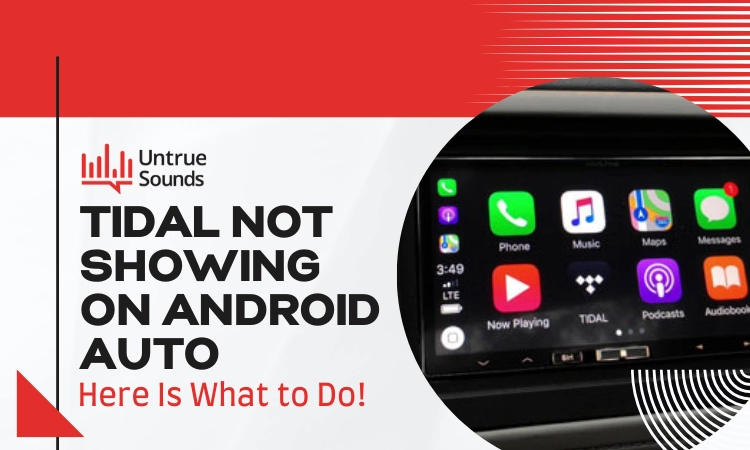Roon is a unified library for your music. It supports platforms like Tidal, Qobuz, Itunes etc. It is well known for music organizational features.
So, is Roon worth it?
Roon is worth it because of the convenience it offers in the form of unified library of multiple streaming platforms. To be more specific, It is worth it for those with a large collection of digital music locally, or throughout other platforms like Qobuz or Tidal. Furthermore, some conditions allow Roon to provide higher fidelity in the audio streamed from the platforms. However, you can’t stream with Roon itself.
Read through the article and you’ll be convinced by the end of it.
Key Takeaways
- Features of Roon include Roon Radio. Comprehensive algorithms, DSP, and so on.
- Roon is worth it if you have a large collection of music throughout multiple music platforms.
- Roon is definitely a luxury rather than a necessity.
Why is Roon Worth It? What Does it Do?
Roon is worth it despite its relatively expensive cost of approximately $12.99 per month because of its versatile functionality. It can organize your large collection of music stored both locally and online in other platforms. Furthermore, it can update the metadata as well as all the artwork for your music which is especially tempting from perfectionists like myself.
As for the costs, Roon subscription costs approximately $12.99 a month and a yearly subscription costs approximately $119.88. YOu can also buy it for lifetime with a single cost of around $500. You’re obviously wondering, “why is Roon so expensive?”
Roon’s high subscription cost is mainly because of its firmware and community support. They offer an hourly rate for all the artists involved in the platform. Because of that, the cost is relatively higher than other platforms.
However, they offer some unique features that you surely would love to know about.
Here are all the functionalities Roon offers to its subscribers-
Reason 1: Unparalleled User Experience of Roon
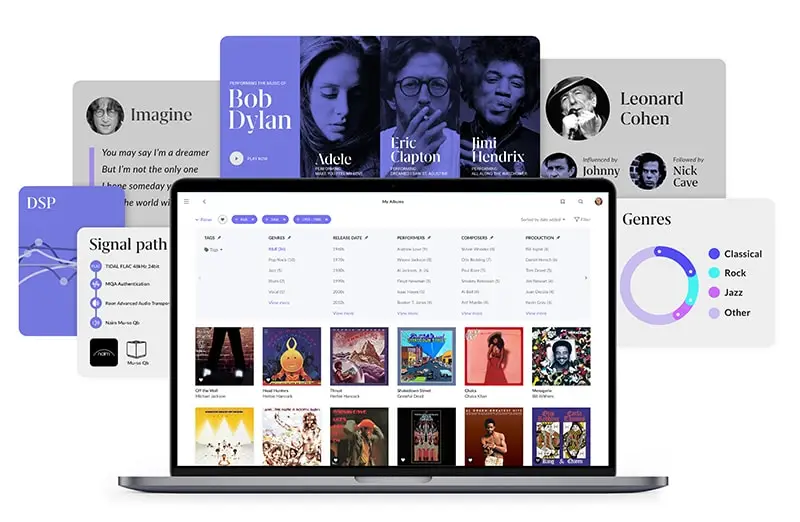
Let’s talk about the Roon user interface. Thanks to in-house developed and licensed information, Roon transforms into the best tool for organizing and accessing your music. These are the main features of Roon that make it convenient for users-
- Easy-to-navigate User Interface
- Access to music from all the integrated streaming platforms
- Competent Genre-Wise Curated Playlists
- Convenient Arrangement of Music According to the User’s Requirements
These are just a few of the additions to the user experience. Furthermore, finding new artists is easy because it’s usually used in conjunction with a service like Qobuz or Tidal. This explains why Roon Labs favors selling continuing subscriptions versus one-time licenses when selling products.
The Roon UI is something like this-
- You can start listening to a selection by tapping on it. When you tap on any of those statistics in the list, it appears with details. Recently Roon also introduced their version 2 and Roon Arc.
- Below this is a row of album cover thumbnails that show more recent listening behavior. A block of recent releases, arranged by albums or singles, can be found by scrolling below.
- This is followed by a graph that analyzes the genres you spent the most time with. A calendar-based chart that displays how much time you spent listening to music each day.
Roon is the best of music playback software can offer. Both for audiophiles and music lovers. The latest Roon 1.8 version brought a lot more upgrades to the software too.
Reason 2: User Friendly Music Organization
Roon allows you to organize and tie up all your offline music files in one place. If you’re someone who wants their music organized minus the tedious efforts, Roon is what you’re looking for.
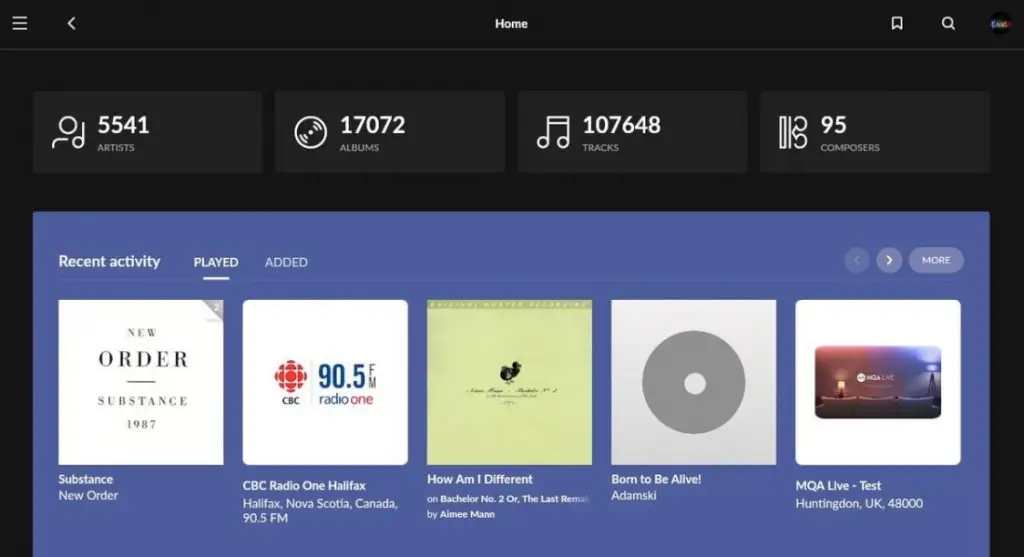
Because Roon does all the organizing of the local and online music files. Yet you won’t feel alien to the organization. Because it uses tags and renames it is convenient to identify.
Furthermore, this doesn’t even require an effort from your side. Throw Roon into the mess that’s your music library and Roon will tidy it up just fine. These make Roon the epitome of convenience and comfort.
Reason 3: Rich Metadata Tagging
Roon provides a rich metadata resource presenting loads of information. This includes but is not limited to reviews, album art, bios of artists, release dates, and such.
That’s why music exploration with Roon is unparalleled. It will literally give you the smallest of info you’re curious to know about. From critical reviews of the song and albums, bio of the primary artists. And credits to everyone who contributed to the piece of work.
Furthermore, the metadata quite literally transforms how you interact with music. With hyperlinks on artists, date of release, album art, and lyrics. As I’ve mentioned before, this convenience is why many audiophiles opt for the subscription.
Roon also plugs critical reviews of the music you’re listening to. If music is something essential to life for you, you’ll love this function. Because I do, being an avid music fan.
Reason 4: Streaming Platform Integration
Roon offers integration of your local library with Tidal, Qobuz, or iTunes etc. Provides that you have a subscription to those platforms and have music on them as well. It presents both online and offline music together seamlessly.
However, Roon is more worth it if used in tandem with both Tidal and Qobuz. That’s because the larger the collection, the brighter Roon shines.
Reason 5: Smart Algorithm Utilization
Roon has a smart algorithmic feature to link together your local music collection. And streaming services you’re subscribed from. It provides a recommendation engine utilizing the smart algorithm.
And the recommendations you’ll get will be perfectly matched to your music preference.
Reason 6: Advanced Network Playback
Roon offers lossless playback of music across multiple devices attached to your home network.
Reason 7: Application of DSP
Roon has the ability to apply advanced digital signal processing to each individual audio zone.
Reason 8: Roon Radio
Roon Radio is the feature that allows Roon to curate music to your tastes and it does that through machine learning. Furthermore, the more you listen to music with Roon, the more accurate the curation gets.
One of the features I like the most about Roon is the Roon Radio. Play a song (or playlist) that expresses your present mood. And once it has finished playing, Roon will continue to play songs that are similar.
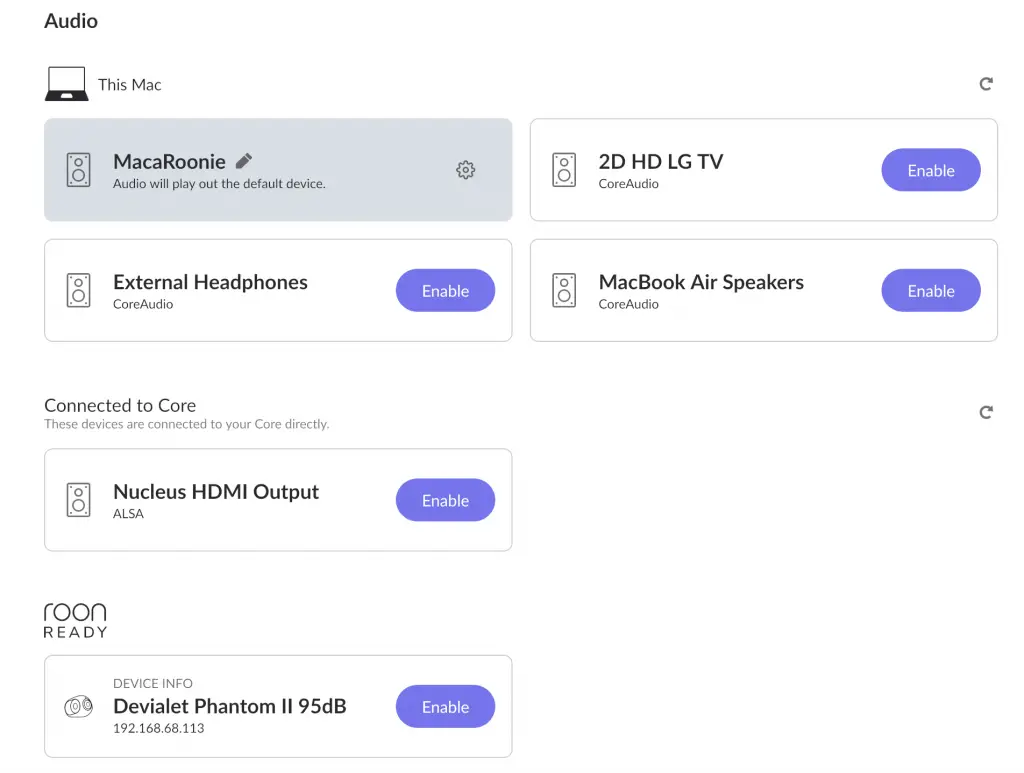
Or linked to that song based on data that the servers have collected from all users of Roon. Roon Radio can access your library and favorite streaming sources through integration.
The recommendation is unbelievably accurate. But it’s no magic, it’s the power of machine learning and artificial intelligence. Roon improves recommendations as you use it more since it gets to know your tastes more.
That’s a lot of functionality. You’re getting this much functionality with the subscription. That should justify the price of Roon. Now let’s take a look at the components of Roon to know whether is Roon worth it or not!
Components of Roon
The 2 primary components of Roon are: Roon Core, and Roon Remote. Roon Core basically acts a server that distributes the music. Then the Roon Remote works as a playback software that plays the music distributed from Roon Core. Finally, Audio Devices are not a part of Roon itself but they’re essential for listening to music nonetheless.
Let’s go through the components one by one.
Roon Core:
The Roon core is the brain of the Roon system. This is the software that essentially makes your computer or Mac act like a server for all the local and streaming service library.
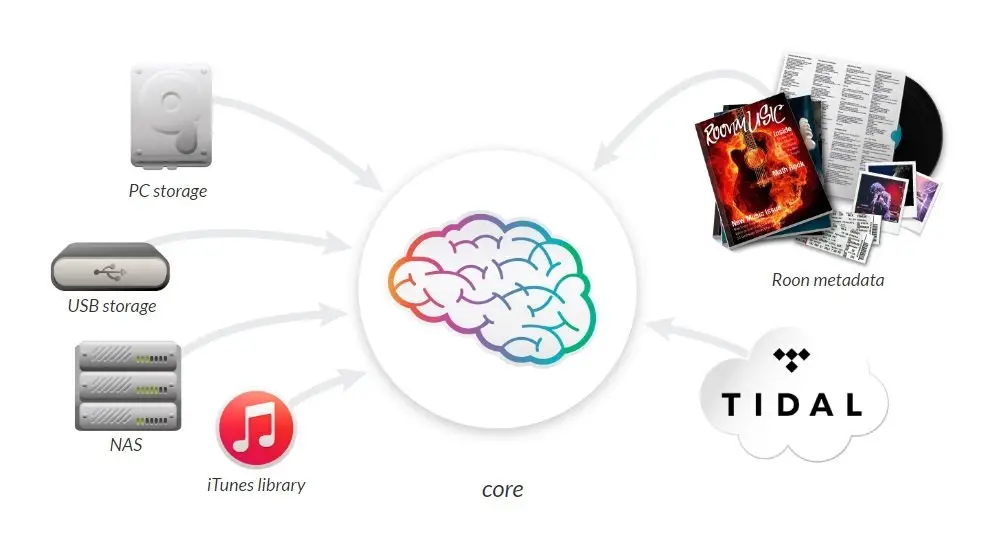
In order to use Roon, you’ll need a Windows or Mac operating system running on the computer. Your music files will be managed and served by Roon in your home network. This typically has a physical connection to the music storage and runs the Roon Core software.
Some users may choose to run Roon’s own Linux-based operating system and dedicate their machine to it.
Roon Remote:
The Roon Core distributes music to Roon Emote. Roon Remote is available across all devices i.e., Mac, iOS, Windows PC, and Androids.
The best part is all these features of Roon are available on its platforms. Using the app, you can choose what it displays with music. You can choose album artwork, artist bio, or real-time lyrics.
Audio Devices:
Roon Core can play music on all audio devices on your home network. Roon radio devices are network players with software built-in. And they’ve been optimized and certified for maximum compatibility.
The audio devices either connect via USB or HDMI or use other network protocols. Like Airplay, Chromecast, or Sonos.
Roon is only restricted by the bandwidth of your home network. Along with the processing power of your Roon core.
However, if you don’t have a Hi-Fi audio device, you can’t really enjoy the lossless music. So, get your premium headphones such as Audio-Technica ATH-M50X or Beyerdynamic DT 770 PRO.
Or you can go for IEMs like IKKO OH10 IEM or Moondrop Aria Earphones. All of these devices are exceptionally better.
Signal Path and Format Support of Roon
The keen attention to technical requirements is what separates audiophiles from general users. The former is obsessed with DAC charts and stats.
For them, DAC is worth it. Whereas the latter just wants the music to play with the least amount of hassle.
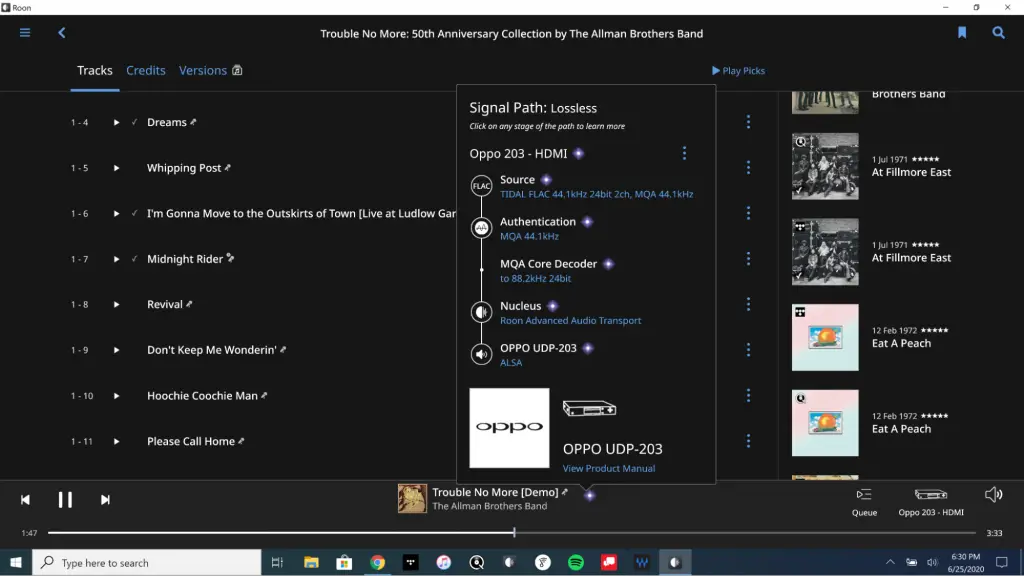
So don’t worry, my spec-driven friends; Roon provides more insight into what’s happening. More than any other music playback application I’ve encountered.
In Roon Remote, the “Signal Path” is readily visible. And a colored indicator in the application’s footer denotes the quality of the playback.
The quality of the audio playback is indicated by the color of the indicator. Which changes when clicked to open the Signal Path detail panel.
- Bright Purple: Lossless, meaning that the stream is traveling directly from the file to the device.
- Shining Blue: Enhanced – The audio is subjected to user-selected signal processing by Roon. (volume leveling, DSP Engine, etc.)
- Green: High Quality – DSP volume and OS Mixer outputs (or conversions for compatibility).
- Yellow: Playback of a lossy file format with low quality.
Roon supports all digital formats of audio including mp3, FLAC, MQA, and so on. So, you don’t have to choose between FLAC or MQA for this platform. While Roon is worth it, there are some drawbacks of this platform.
Limitations Of Roon
While providing a fantastic user interface, a rich metadata experience, and library connectivity, Roon. Additionally, it currently has limitations when it comes to in-home music delivery.
- Inability to travel and expect to connect to the Roon database on the road.
- There isn’t an offline mode. And there’s no method to locally sync files to a playback device right now.
The limitations are for temporary times. Which a digital streaming service can solve.
Price of Running Roon
For taking the most out of what Roon software offers, you’ll need to subscribe to music streaming services like Tidal. Furthermore, expensive audio equipment will be necessary to enjoy the lossless music from Roon.
But that doesn’t mean you can’t use Roon without expensive equipment. So unless the music is your passion and you like to deep dive, spare the money.
And for those who are willing to spend, here they are-
- Roon Labs Nucleus costs about 1500 dollars per year.
- Roon Nucleus Plus costs about 2500 dollars per year.
Both these models come with a year’s worth of Roon subscription. And the subscription itself costs $700 for a Roon lifetime account. And there’s a free trial as well for those who want to dip their toes. However, once you experience the greatness of the quality Roon offers, you’ll never go back.
Is Roon Lifetime worth it? It absolutely is. Firstly you get a massive discount.
And after the subscription, you don’t have to worry about subscription renewal.
My Final Verdict: Should You Get Roon for Yourself?
My Final Verdict is that yes, you should get Roon because of how convenient it makes the process of organizing music. It also saves hours of time. But it’s not worth it if you don’t have a large collection of music throughout multiple platforms.
That’s because doing it yourself is more cost-effective at that point. I’ll now answer some frequently asked questions before finishing the article.
Frequently Asked Questions (FAQs)
Does Spotify Work With Roon?
You can’t use Spotify with Roon and listen to Spotify songs on Roon. Because Spotify does not offer its service to Roon. Some people might believe that they can download Spotify songs with a premium membership. Then play Spotify music on Roon. This approach is essentially pointless.
Can Roon Play Apple Music?
In order to be connected with a streaming service, Roon needs special access to the metadata. If and when Apple works with Roon to share the metadata for the music catalog. Integration across Roon with Apple Music will be conceivable. Which Tidal and Qubuz did, hence they are integrated into Roon.
Does Roon Improve Sound Quality?
It does. Thanks to the upgrade of the Roon software, it improves music quality pretty well. Roon can convert music quality to a higher kbps. With an additional Roon app and a Roon DSP, you play music. The difference in quality in music is clearly audible. Which is hard to find in other competitors.
Closing Note
So that was all I had to offer on is Roon worth it. From a passionate music lover, it sure is. But even if you’re a casual music listener, the monthly Roon subscription is also worth it.
So, what do you think? Would you like to give Roon a try? Let me know!
Good luck!


